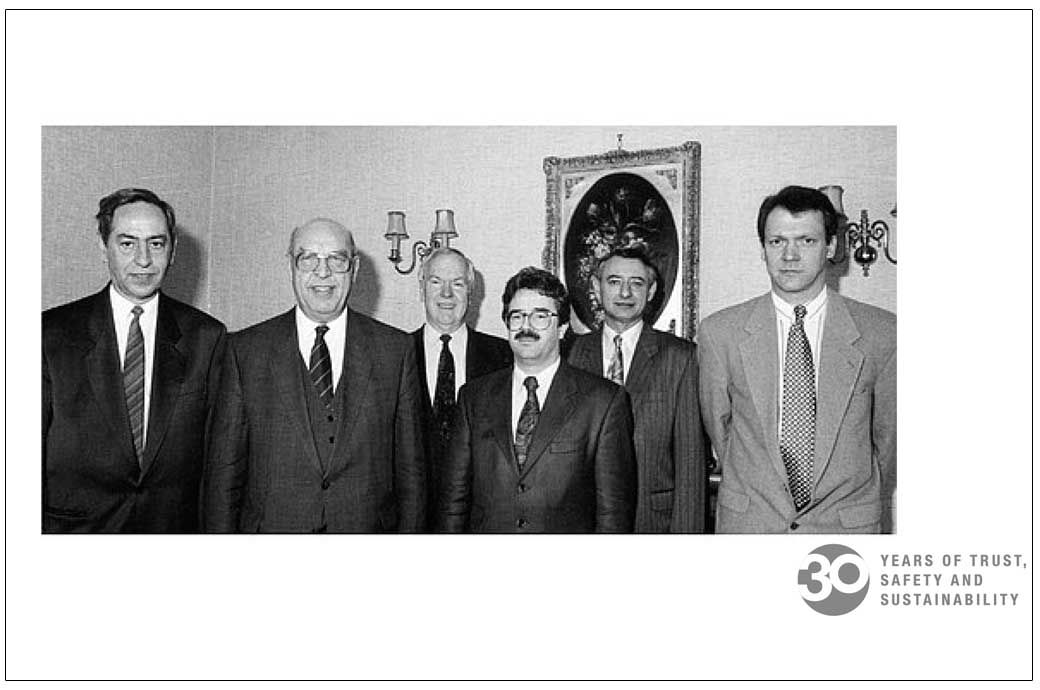
In the early 1990s, there was a growing awareness of harmful substances in textiles. Manufacturers and consumers alike wanted to know what chemical ingredients were in the different textiles. Due to globalisation and increased imports and exports, this demand continued to grow. Brigitta Colbert, then head of the chemical/analytical laboratory at OETI, remembered the early days: “There were inquiries from customers – mainly from consumers, but occasionally also from industry – especially when health impairments were caused by a specific fabric and the manufacturer was confronted with it. At that time, however, there were no regulations for harmful substances. In collaboration with experts from the textile and chemical industry, we started to develop schematic test procedures for various textile materials so that we could test them in a more targeted manner. With ÖTN 100, we were actually the first company in Europe to lay the foundation for this type of testing.”
In the development phase, a lot of emphasis was placed on differentiated and transparent testing factors right from the start, the expert explains: “On the one hand, it was important to offer special tests for special textiles; on the other hand, it was important to us to never lose focus of the production and disposal processes themselves, such as the quality of human ecological properties. A modular testing procedure made this possible for us. Today we cover everything in the production process and the STANDARD 100 by OEKO-TEX is one of the world’s best-known labels for textiles tested for harmful substances. It represents consumer confidence and high product safety.”
The last thirty years have been marked by numerous developments and changes, explained Helene Melnitzky, head of the ecology department at OETI: “For example, in the beginning, we had to face the strategically important decision to purchase technical equipment in the chemical analysis area to meet the requirements for detection limits. At that time, this was a new path for us as a testing institute, and of course, the industry was watching with great interest to see what would happen next. When we were still on the market two years later, it was quite remarkable. Over the years, our customers became long-term partners.” Another important milestone was certainly the founding of the branch in Egypt.
But how has today’s OEKO-TEX product STANDARD 100 evolved from its predecessor (ÖTN 100)? Melnitzky added: “A lot has changed. We have consistently grown with the new requirements of the textile industry. Legislation has also evolved over the years and certain standards have been redefined accordingly. Consequently, our product portfolio has also changed.” However, one thing that has proven to be very successful since the beginning without needing to be adapted is the modular testing system. “We start at the beginning of the production chain, and each individual sub-area can be certified, just like the end product. This approach still makes us unique.”
For buyers, wholesalers and customers, the certifications soon became an important safety aspect. “There was more and more pressure from the Austrian textile industry, but also from end consumers who wanted to buy healthy and sustainably produced clothing. Our label gradually evolved into an important tool for identifying high-quality suppliers. And pretty soon, it also became indispensable for tenders and requirement catalogues of companies and the public sector, explained Helene Melnitzky. The topic of environmentally friendly production facilities also shifted into focus. From 1994 onwards, there was a certification for this topic, and in 2012/13 the label was converted into a production certification with STeP. “This certification includes environmental performance, social criteria, occupational health and safety, and management systems. In the beginning, slightly less than 60 companies underwent this certification. Today, there are already 850 companies worldwide with this certification. The OEKO-TEX MADE IN GREEN label, which was introduced in 2014, is also intended to show end consumers that a product has been manufactured without harmful substances and in an environmentally and socially responsible manner.’
The founding of the International OEKO-TEX association in 1992 was another strategically and economically important decision to secure clear positioning in the market. “At that time there were already several other institutes. Therefore, we wanted to create a platform for exchange and implement the standards internationally. A small alliance has since grown into a large association. Currently, we have seventeen testing institutes in Europe and one in Japan.”
For the coming years, Helene Melnitzky outlines numerous relevant topics that also play a role in OEKO-TEX’s continuous development: “For example, we will be offering the carbon footprint label on the product in the very near future due to upcoming EU regulations that require the footprint to be shown and priced accordingly. Everything to do with recycling processes and supplier due diligence is also a key element of our operations. Demonstrating that everything along the entire supply chain was carefully selected to ensure that environmental standards and social aspects are met is now more important than ever to meet climate targets in the textile industry.”
ALCHEMPro News Desk (GK)
Receive daily prices and market insights straight to your inbox. Subscribe to AlchemPro Weekly!